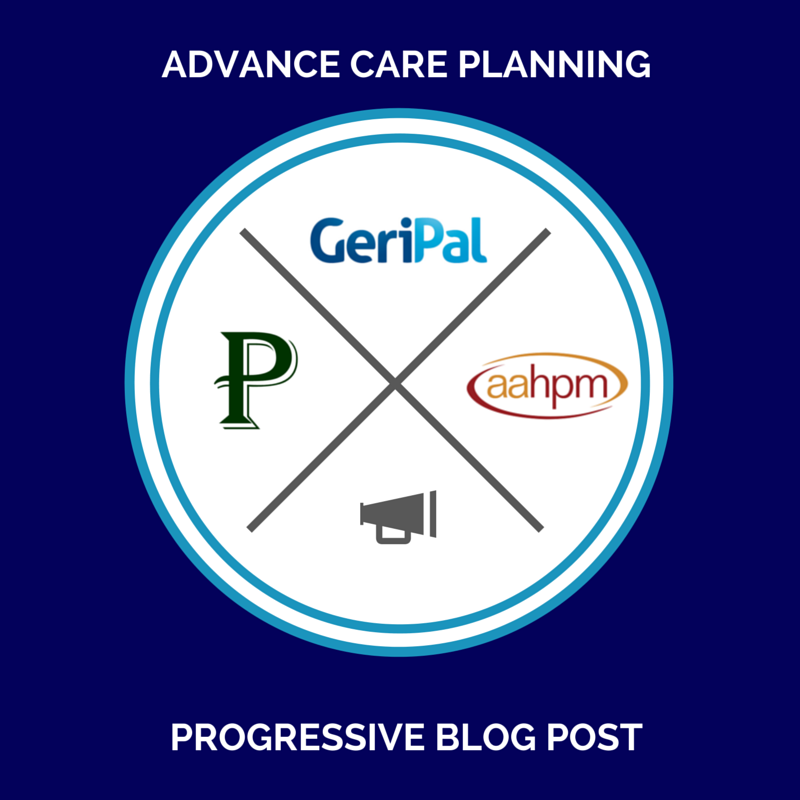
The following is part of a three-post progressive blog about the Center for Medicare Medicaid Services (CMS) choosing not to pay for the new advance care planning codes in this year’s Medicare Physician Fee Schedule. However, now is the time tell CMS why you support reimbursement for advance care planning services in their call for comments. Please see also Phil Rodgers post on CMS considering reimbursement for Advance Care planning at Pallimed, and Gregg VandeKieft’s update on the state of ACP advocacy at the AAHPM blog.
What will it take for advance care planning to become routine for patients with serious illness?
It is time for US policy makers to put away the negative connotations of the “Death Panel” days and have a mature discussion about serious illness. No matter what your political persuasion, it is time for us to act to improve the quality of care given to all patients by promoting health advance care planning. With excellent communication and advance care planning, we can empower patients and families to ask for and receive the care that best fits their values and clinical situations.
From an optimistic viewpoint on advance care planning:
- There is now clear guidance to policy makers
- The Institute of Medicine (IOM) report, Dying In America, sends a clear message to policy makers by highlighting clinician-patient communication and advance care planning as one of the key areas of focus and recommendations. The IOM report recommends that standards for clinician-patient communication and advance care planning be developed that are measurable, actionable, and evidence-based. The report states that “payers and health care delivery organizations should adopt these standard and their supporting processes, and integrate them into assessments, care plans and the reporting of health care quality”
- There is an evidence base for communication and advance care planning
- The journal JAMA Internal Medicine recently published an excellent article from the American College of Physicians High Value Care Task Force, Communication about Serious Illness Care Goals: A Review and Synthesis of Best Practices. Drs. Bernacki and Block report that communication about serious illness care preferences improved clinical outcomes without increasing anxiety, depression, or loss of hope, but did reduce surrogate distress. The practical guidance for clinicians section is a MUST READ.
- There are resources for patients and families
- Rebecca Sudore and her team’s Prepare for your care (see theGeriPal discussion here) and Ellen Goodman’s Conversation project are two excellent resources that empower patients and families to start the difficult conversations about serious illness that you should be promoting to patients, families and clinicians.
- There are resoucrces Health Care providers can use to learn to do this well
- VitalTalk is a great place where clinicians can develop the skills of challenging conversations. Check out the VitalTalk clinicians section where you can view quick guides on key skills and then try the Watch, Read, Reflect sub-section to improve your skills.
It is time for advance care planning to be a standard of care. Completion rates nation-wide should be as good as LaCrosse, Wisconsin. Excellent, on-going advance care planning that is adapted to the patient’s values and needs over time should be an expectation of quality doctor-patient communication.
But, we have work to do. At a recent large national meeting of primary care physicians, an audience poll found that most physicians acknowledged the importance of advance directive. However, most report they do not routinely address advance care planning. A key factor was time.
Unspoken in that audience poll is the statement that time is money. For practitioners in most health systems in the US who are still in a fee-for-service model, the economic pressures are intensifying and advance care planning is not adequately reimbursed. But we can change that!
The 2015 Medicare Physician Fee Schedule (MPFS)for the first time includes Advance Care Planning (ACP) services and there are now two CPT codes for these ACP services: 99497 and 99498. CMS has acknowledged both codes, but did not authorize Medicare to pay for them in 2015 (see Phil Rogers’ Pallimed Post for more details on what the MPFS is and what these CPT codes are).
While it is unfortunate that CMS did not agree to start reimbursing the ACP codes for 2015, they did provide a call for comments until December 30. So, stop reading this post and go to the CMS website (here) to tell them why you support reimbursement for ACP services.
by: Paul Tatum (@doctatum) with Eric Widera (@ewidera)

Note: For more information, please see also Phil Rodgers’ post on CMS considering reimbursement for Advance Care planning at Pallimed, and Gregg VandeKieft’s update on the state of ACP advocacy at the AAHPM blog. The following is from Phil’s post on things to consider when writing your comments which can be submitted online here:
- Tell why you think it’s important to pay for ACP services through a specific mechanism. CMS has suggested that it believes Medicare already pays for ACP services through the Evaluation and Management (E/M) and extended service codes. Tell them about the unique value of advance care planning, and how it is ‘separately and identifiably’ necessary in addition to all other services (medical therapy, symptom management, etc.)
- Be specific, be yourself, and write about what you know. It’s OK to reference the literature about ACP services and palliative care, the IOM report, the importance of tracking the frequency ACP is performed, the needs of an older and sicker society etc., but it’s more powerful to speak from personal experience. Tell patient stories that illuminate a connection between high quality advance care planning and better care for your patients. Every HPM professional I know has dozens if not hundreds such stories. Now is the time to tell them.



